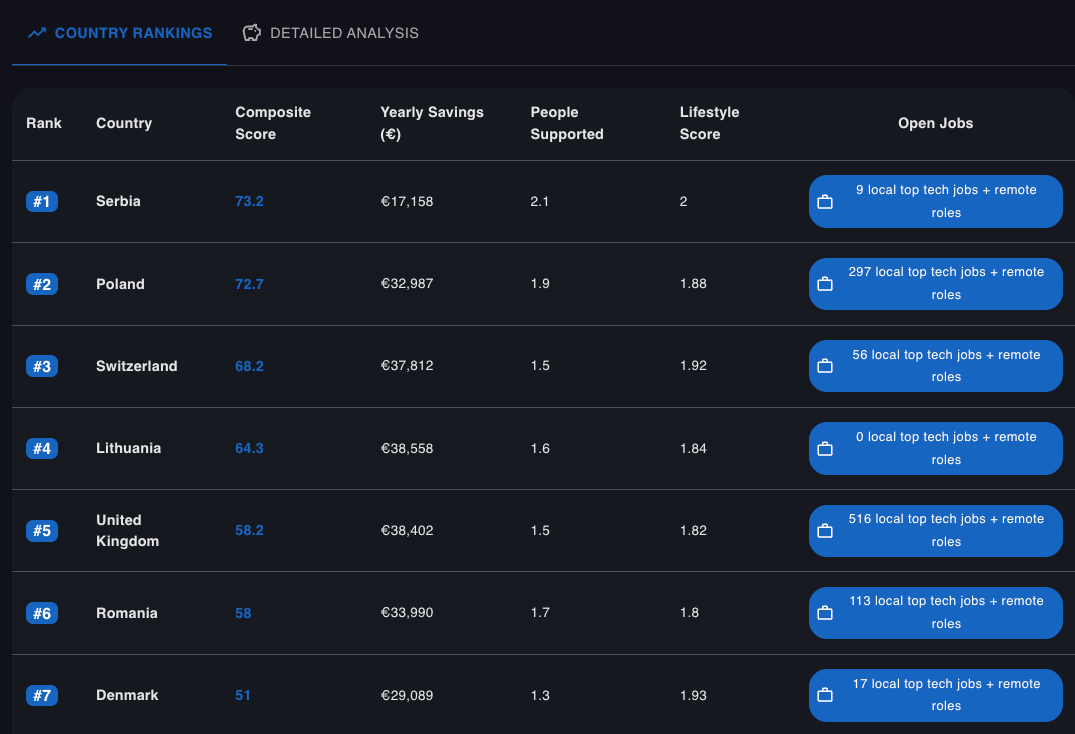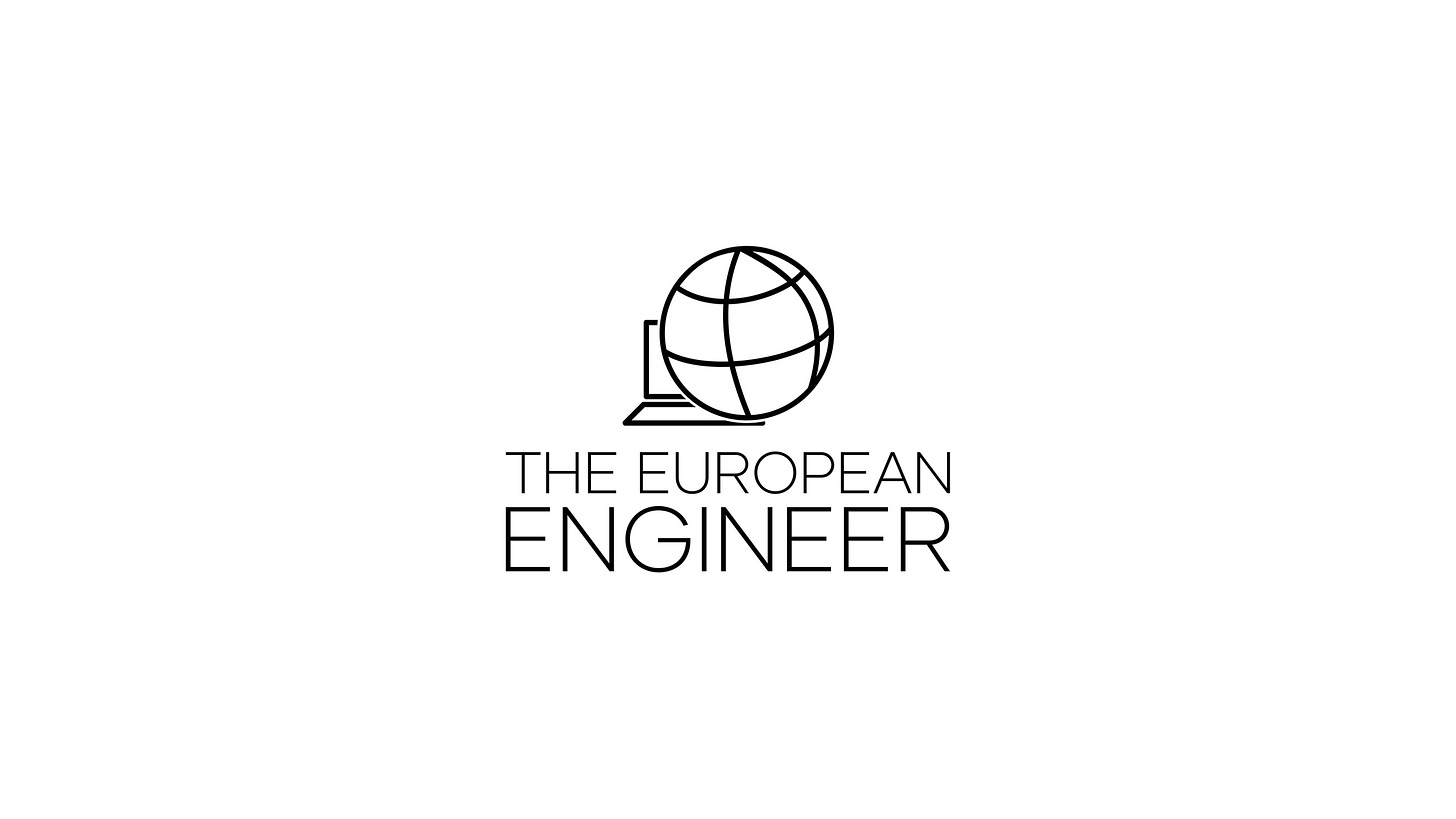Euro Top Tech Jobs - Week 56
Serbia?
First off - hit 50k followers on LinkedIn. Pretty crazy!!
Second: the more time passes, the more I’m convinced that High-Paying Remote is the new FAANG
Third: Especially now as young startups with 1-500 employees pay $100-300k+ for people wherever they are
For this type of setup, Serbia, Bulgaria, Lithuania (and the obvious Poland and Romania) are going strong.
Serbia is now the nr.1 on Euro Tech Money
With 20 contributions. Not enough, but not too bad.
We need more contributions for: Serbia, Lithuania, Romania and Bulgaria.
If you have friends working from these countries, send them over to the site and ask them to contribute!
Also if they don’t live in these countries ;)
Taxes in Serbia
I’m preparing a deep-dive on this.
Feel free to let me know any other info that you might have and/or to just send me a better write up on the topic (including pros and cons of living in Serbia).
I might make an another article similar to these ones on Poland, Switzerland, Germany.
I’d also like to make one on Spain!
So if you’re a dev in Spain and know the situation well (ideally you need to make 100k+ since my guides are more geared towards devs targeting the top 1% of the market), shoot me a DM!
Here’s what I got on Serbia:
(it’s basically a message from a dev based there which I refactored with ChatGPT - things might not be fully accurate, feel free to verify and let me know how they actually are!)
Working in Serbia as a Developer
Freelancer • Sole Proprietor • Limited Liability Company (d.o.o.)
Tax year 2024 – 2025
This guide explains the three ways developers can bill clients from Serbia and the key tax points for each option.
1. Freelancer Scheme (Quarterly Self-Taxation)
Who you can invoice
• Foreign companies
• Serbian private individuals
→ Serbian companies cannot pay you under this scheme.Tax models
Option A – first 96,000 RSD per quarter tax-free; the rest taxed at 20 %.
Option B – deduct 57,900 RSD + 34 % of gross; the rest taxed at 10 %.Social contributions
24 % pension + 10.3 % health on the taxable base.
Health is skipped if you already have insurance from another job.
Contributions stop once income passes the legal monthly cap (656,425 RSD in 2025).Reporting
File and pay online each quarter via the Tax Administration “Freelancers” portal.Pros / Cons
Very simple and no accountant needed, but you cannot bill Serbian companies and some foreign clients insist on a registered entity.
2. Sole Proprietor (Preduzetnik)
2.1 Lump-Sum (“Paušalac”)
Available while annual turnover ≤ 6,000,000 RSD (≈ €51 k).
Pay a fixed monthly amount (usually a few hundred € for IT).
No bookkeeping beyond a simple invoice log.
Easy to pause or close.
2.2 Standard Accounting
10 % income tax on profit (revenue – expenses).
24 % pension + 10.3 % health + 1.5 % unemployment on the same profit.
Requires double-entry books and an accountant (≈ €100 – 150 / month).
No ceiling: taxes and contributions keep rising with profit.
2.3 Independence Test
Nine legal criteria; you must meet at least five to stay classified as independent.
Failing an audit triggers retroactive payroll taxes and penalties.
Audits are still rare, but the potential liability can be high.
Typical use cases
Lump-sum: multi-client work under the 6 m RSD ceiling.
Standard: higher turnover or large deductible expenses.
Short, low-risk gigs (Fiverr, Upwork) if you accept the audit risk.
3. Limited Liability Company (d.o.o.)
Corporate tax 15 % on net profit.
Dividend tax 15 % withheld when profits are distributed (≈ 27 – 28 % total).
Salary requirement At least one director/employee must draw a salary; minimal wage level costs about €200 – 300/month in payroll taxes.
Profit withdrawal Common approach is a small salary + dividends. Salary above the monthly cap only incurs 10 % income tax.
High-income surtax 10 % if annual salary exceeds 4.8 m RSD; 15 % above ~8.3 m RSD. Exemption from the first band for developers under 40.
Running costs Accounting ≥ €150/month plus minor statutory fees.
Closure Liquidation takes 3 – 6 months and you keep paying the minimal salary and accounting. Many owners instead sell the company.
4. VAT Registration
Mandatory once turnover in the previous 12 months exceeds 8 m RSD (≈ €68 k).
Applies whether clients are domestic or foreign.
Standard VAT rate 20 %; reduced rate 10 % for limited goods/services.
Voluntary registration is possible below the threshold.
Quick Selection Guide
Occasional foreign gigs, < €40 k/year, no Serbian clients → Freelancer
Need to bill Serbian companies, turnover ≤ €51 k → Sole proprietor (lump-sum)
Higher revenue or large expenses, okay with bookkeeping → Sole proprietor (standard)
Long-term single client, plan to hire staff, want legal separation → d.o.o.
Useful Links
Tax Administration freelancer portal & calculator
https://frilenseri.purs.gov.rs/en/tax-calculator.htmlIndependence-test criteria (nine-point checklist)
https://stavlaw.rs/independent-contractor-test-in-serbia-compliance-key-points
Bottom Line
Choose the simplest structure that fits your client mix and revenue:
Freelancer – easiest start, foreign clients only.
Lump-sum sole proprietor – low fixed tax under the 6 m RSD ceiling.
Standard sole proprietor – flexible, but needs accounting and carries audit risk.
d.o.o. – higher upkeep, separate legal entity, useful for scaling.
Thresholds adjust every year; check current figures before committing and budget for a local accountant if you move beyond basic freelance work.
This article is brought to you by:
Euro Top Tech Jobs - The #1 resource for landing Top-Paying Tech roles in Europe:
4000+ top paying tech jobs in Europe from big tech companies, HFT firms and high-paying scale-ups.
Hundreds of jobs from 100+ fully-remote companies paying $100-600k per year.
Private guides - like this one - to help you land these jobs.
Six Figure Euro Engineer - Maximise your chances to boost your Tech Career in Europe, reducing time to success:
Work 1:1 with me (Nicola Amadio, author of this newsletter), and join the other engineers who were able to 10x their tech career in the past few months!





